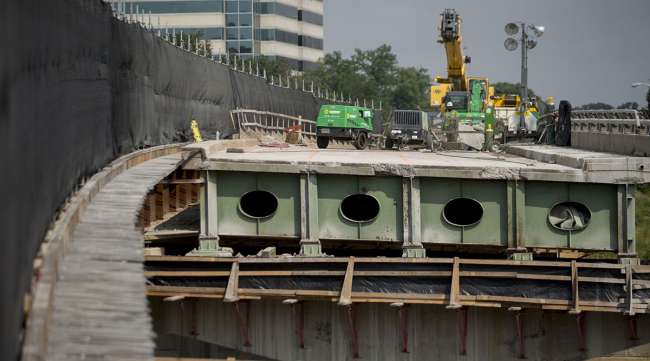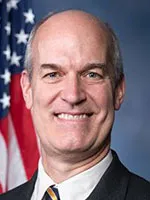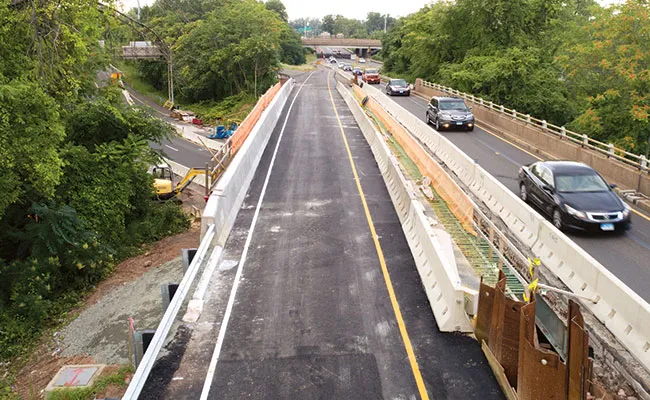Senior Reporter
House Transportation Lawmakers Spotlight Highway Trust Fund

[Stay on top of transportation news: Get TTNews in your inbox.]
Transportation leaders in the U.S. House of Representatives recently raised awareness about the funding needs of an account central to highway projects.
Rep. Rick Crawford (R-Ark.), Highways and Transit Subcommittee chairman, recently called attention to the upcoming task of identifying a sustainable source of funding for national highway programs. The account specific to such projects, the Highway Trust Fund, was stabilized temporarily by the $1.2 trillion Infrastructure Investment and Jobs Act.
“We need to work together to reform the Highway Trust Fund to ensure that users who benefit from the system pay into the system. A long-term, sustainable solution is necessary to provide our state, local and private sector partners the certainty they need to plan and build their projects,” Crawford said during an Oct. 18 hearing.
“We need a solution so that we can build a modern and efficient transportation system to meet the needs of our 21st century economy,” the chairman said, adding, “Our nation demands, and deserves, a system that will move people and goods safely and efficiently, expand opportunities across all communities, enhance American prosperity, and ensure American industry and innovation continue to lead the world.”

Larsen
Rep. Rick Larsen (D-Wash.), Transportation and Infrastructure Committee ranking member, echoed calls for ensuring the trust fund’s long-term solvency. The committee’s top Democrat also pointed to the highway account’s reliance on funding associated with the 2021 bipartisan infrastructure law.
“Thanks to the continuity provided by the Highway Trust Fund, states, local governments and tribal governments go into every construction season with the certainty needed to move ahead on planned projects without delay,” Larsen said.
“In the coming decades, with anticipated increases in population and demand for freight transportation, sustained and predictable investment in our infrastructure and in safe mobility will only grow in importance,” he continued. “In the next surface transportation reauthorization, Congress will have to decide how to fund transportation investments and whether or not to adjust the sources and levels of revenue that go into the Highway Trust Fund.”

Road construction in Connecticut. Thanks to the IIJA, the Highway Trust Fund will be able to meet its obligations through 2026. Afterward, analysts estimate the fund will necessitate additional congressional action to help guarantee its solvency. (portal.ct.gov)
The fund relies on insufficient revenue from the federal 18.4 cents-per-gallon tax on gas and 24.4 cents-per-gallon tax on diesel. Those tax rates were approved in 1993.
At the hearing with House lawmakers Oct. 18, Jeff Davis, senior fellow at the Eno Center for Transportation, suggested the panel scrutinize the account over the coming years. “From a truth-in-budgeting perspective, the choice seems clear: It’s time to either mend, or end, the Highway Trust Fund,” Davis told the transportation committee.

Davis
“Either cut spending and/or increase user revenues to the point that they meet once again, or abolish the trust fund, devote the five existing user taxes back to the general fund, and have highway, mass transit, and highway and motor carrier safety funding fight it out with all other programs through the budget process,” Davis proposed.
Chad Shirley, principal analyst at the Congressional Budget Office, shared with policymakers a range of options designed to tackle the trust fund’s looming shortfall. He mentioned imposing a vehicle-miles-traveled tax on a variety of vehicles. As he put it, “One option would be to impose a VMT tax on commercial trucks.”
The bipartisan IIJA approved transfers to the Highway Trust Fund to ensure the account is able to meet its obligations through 2026. Afterward, analysts estimate the fund will necessitate additional congressional action to help guarantee its solvency.
The fund is used for assisting states with construction and maintenance projects. The account’s looming insolvency is a matter under the jurisdiction of the congressional tax-writing committees.
Want more news? Listen to today's daily briefing below or go here for more info:




